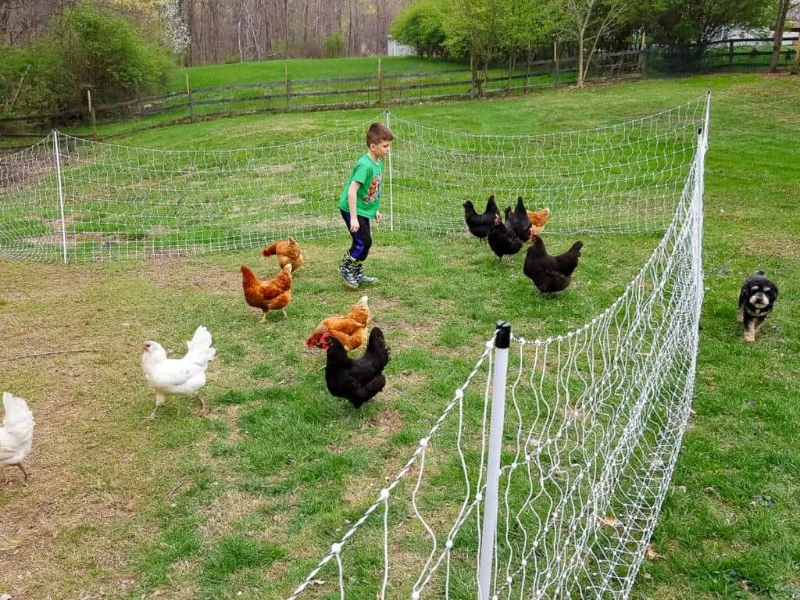
The Pros and Cons of Keeping Pet Chickens in Your Backyard
- 1. Introduction: Why Keep Chickens in Your Backyard?
- 2. The Pros of Keeping Pet Chickens
- 3. The Cons of Keeping Pet Chickens
- 4. How to Care for Pet Chickens in Your Backyard
- 5. Conclusion: Is Having Pet Chickens Right for You?
1. Introduction: Why Keep Chickens in Your Backyard?
Keeping pet chickens in your backyard can be a rewarding experience, offering fresh eggs, a unique hobby, and a closer connection to nature. However, before making the decision to raise chickens, it's essential to understand both the benefits and challenges that come with it. This article will explore the pros and cons of keeping pet chickens in your backyard, helping you make an informed decision about whether it's the right choice for you and your family.
2. The Pros of Keeping Pet Chickens
There are several reasons why people choose to keep chickens in their backyards, ranging from sustainability to companionship. Here are some of the main benefits:
- Fresh, Local Eggs: One of the biggest advantages of keeping chickens is having a steady supply of fresh eggs. Nothing beats the taste and quality of eggs from your own backyard, and chickens typically lay more eggs than a small family can consume.
- Environmental Benefits: Chickens are natural composters, and their droppings can be used to fertilize your garden. Additionally, raising chickens reduces your carbon footprint by decreasing the need for store-bought eggs that are often packaged in plastic and shipped long distances.
- Education for Kids: Keeping chickens offers a great educational experience for children, teaching them responsibility, animal care, and the importance of sustainability. Kids can learn about the food cycle and gain valuable lessons on how to care for living creatures.
- Natural Pest Control: Chickens are excellent at controlling pests such as insects, ticks, and even small rodents in your yard. They will happily scratch and peck at the ground, helping to keep unwanted pests at bay.
- Companionship: Chickens can become surprisingly affectionate pets. While they are not the same as traditional pets like cats or dogs, many chicken owners report that their chickens become part of the family and enjoy human interaction.
3. The Cons of Keeping Pet Chickens
While there are many benefits to keeping chickens, there are also some downsides that you should be aware of. Here are some of the challenges you might face:
- Time and Effort: Raising chickens requires a commitment of time and effort. You need to provide them with food, water, and shelter, clean their coop regularly, and monitor their health. If you're not prepared for the responsibility, it may become overwhelming.
- Noise: While chickens are generally quiet, roosters can be very noisy, especially early in the morning. If you live in a residential area, the sound of a rooster crowing could be disruptive to your neighbors.
- Initial Costs: The startup costs for keeping chickens can be significant. You will need to invest in a chicken coop, fencing, food, and bedding. While the cost of raising chickens is relatively low after the initial setup, it may still be a barrier for some people.
- Predator Risks: Chickens are vulnerable to predators such as raccoons, foxes, and hawks. You will need to ensure that their coop is secure and that they are protected from potential threats.
- Health Risks: Chickens can carry diseases like Salmonella, which can be transmitted to humans. Proper hygiene and handling are essential to minimize health risks. Additionally, chickens may also carry parasites like mites or lice, which can affect both the chickens and your garden.
4. How to Care for Pet Chickens in Your Backyard
If you've decided to keep chickens in your backyard, it's important to provide them with the proper care and environment to ensure they thrive. Here are some tips for keeping your chickens healthy and happy:
- Provide Proper Housing: Chickens need a secure, dry, and well-ventilated chicken coop to protect them from the elements and predators. Make sure the coop is spacious enough for all your chickens and has nesting boxes for egg-laying.
- Ensure Cleanliness: Regularly clean the coop to prevent the buildup of waste and bacteria. Fresh bedding and clean water should be provided daily to maintain a healthy environment.
- Balanced Diet: Feed your chickens a balanced diet of high-quality poultry feed, supplemented with occasional kitchen scraps like vegetables, grains, or even leftover rice. Ensure they have access to grit to aid in digestion.
- Provide Safe Space: Let your chickens roam free in your yard, but make sure it's securely fenced to protect them from predators. Allow them to forage and scratch the ground for bugs and food.
5. Conclusion: Is Having Pet Chickens Right for You?
Deciding whether to keep chickens in your backyard ultimately depends on your lifestyle, resources, and willingness to commit to their care. While chickens can provide fresh eggs, environmental benefits, and educational experiences, they also require time, effort, and a secure environment. If you're prepared for the responsibilities, keeping chickens can be a rewarding experience. However, if you're not ready for the commitment, it's best to consider whether it's the right choice for you and your family.
For those looking to get started with raising chickens or need advice on chicken care, visit Omnia Pet for expert recommendations on products and services for your backyard flock.








 Caring Hands Animal Hospital: Feltz Tim DVM4.0 (191 reviews)
Caring Hands Animal Hospital: Feltz Tim DVM4.0 (191 reviews) Titan Veterinary Services4.0 (663 reviews)
Titan Veterinary Services4.0 (663 reviews) Bark Place4.0 (120 reviews)
Bark Place4.0 (120 reviews) Vetco Vaccination Clinic3.0 (11 reviews)
Vetco Vaccination Clinic3.0 (11 reviews) Reptile Super Show | LA Pet Fair4.0 (30 reviews)
Reptile Super Show | LA Pet Fair4.0 (30 reviews) The Frenchie Connection Plus0.0 (0 reviews)
The Frenchie Connection Plus0.0 (0 reviews) How to Keep Your Dog's Joints Healthy as They Age | Omnia Pet
How to Keep Your Dog's Joints Healthy as They Age | Omnia Pet Understanding Hyperthyroidism in Cats: Treatment Options and Diet
Understanding Hyperthyroidism in Cats: Treatment Options and Diet Understanding Kitten Weaning: How to Transition to Solids
Understanding Kitten Weaning: How to Transition to Solids The Best Dog Breeds for Seniors and Retirees Looking for Companionship
The Best Dog Breeds for Seniors and Retirees Looking for Companionship How to Help a Kitten with a Broken Tail
How to Help a Kitten with a Broken Tail How to Start a Pet Sitting or Dog Walking Business
How to Start a Pet Sitting or Dog Walking Business